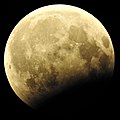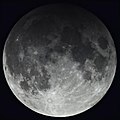February 1971 lunar eclipse
| Total eclipse | |||||||||||||||||
| Date | 10 February 1971 | ||||||||||||||||
|---|---|---|---|---|---|---|---|---|---|---|---|---|---|---|---|---|---|
| Gamma | 0.27413 | ||||||||||||||||
| Magnitude | 1.30819 | ||||||||||||||||
| Saros cycle | 123 (50 of 73) | ||||||||||||||||
| Totality | 82 minutes, 11.4 seconds | ||||||||||||||||
| Partiality | 204 minutes, 42.9 seconds | ||||||||||||||||
| Penumbral | 369 minutes, 37.3 seconds | ||||||||||||||||
| |||||||||||||||||
A total lunar eclipse took place at the Moon's descending node of the orbit on Wednesday, February 10, 1971, the first of two total lunar eclipses in 1971. It had an umbral magnitude of 1.30819. The Moon narrowly missed the center of the Earth's shadow due its gamma being >0.2725 at 0.27413 . The Moon was plunged into darkness for 1 hour, 22 minutes and 11.4 seconds, in a deep total eclipse which saw the Moon 30.819% of its diameter inside the Earth's umbral shadow. The visual effect of this depends on the state of the Earth's atmosphere, but the Moon may have been stained a deep red colour. The partial eclipse lasted for 3 hours, 44 minutes and 42.9 seconds and in total. Occurring only 2.7 days before apogee (Apogee on Saturday, February 13, 1971), the Moon's apparent diameter was 5.9% smaller than average.
Visibility
[edit]It was completely visible from North America, rising from Eastern Asia, Australia, and setting over South America, Europe and Africa.
Related eclipses
[edit]Lunar year series
[edit]| Lunar eclipse series sets from 1969–1973 | ||||||||
|---|---|---|---|---|---|---|---|---|
| Ascending node | Descending node | |||||||
| Saros | Date Viewing |
Type Chart |
Gamma | Saros | Date Viewing |
Type Chart |
Gamma | |
| 108 | 1969 Aug 27
|
Penumbral
|
−1.54066 | 113 | 1970 Feb 21
|
Partial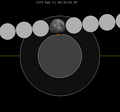
|
0.96198 | |
| 118 | 1970 Aug 17
|
Partial
|
−0.80534 | 123 | 1971 Feb 10
|
Total
|
0.27413 | |
| 128 | 1971 Aug 06
|
Total
|
−0.07944 | 133 | 1972 Jan 30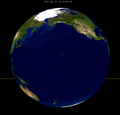
|
Total
|
−0.42729 | |
| 138 | 1972 Jul 26
|
Partial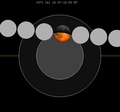
|
0.71167 | 143 | 1973 Jan 18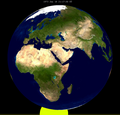
|
Penumbral
|
−1.08446 | |
| 148 | 1973 Jul 15
|
Penumbral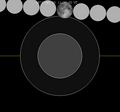
|
1.51782 | |||||
| Last set | 1969 Sep 25 | Last set | 1969 Apr 02 | |||||
| Next set | 1973 Jun 15 | Next set | 1973 Dec 10 | |||||
Saros series
[edit]Lunar saros series 123, repeating every 18 years and 11 days, has 25 total lunar eclipses. The first total lunar eclipse of this series was on July 16, 1628, and last will be on April 4, 2061. The two longest occurrence of this series were on September 20, 1736 and October 1, 1754 when totality lasted 106 minutes.
It last occurred on January 29, 1953 and will next occur on February 20, 1989.
Half-Saros cycle
[edit]A lunar eclipse will be preceded and followed by solar eclipses by 9 years and 5.5 days (a half saros).[1] This lunar eclipse is related to two total solar eclipses of Solar Saros 130.
| February 5, 1962 | February 16, 1980 |
|---|---|

|

|
See also
[edit]Notes
[edit]- ^ Mathematical Astronomy Morsels, Jean Meeus, p.110, Chapter 18, The half-saros
External links
[edit]- 1971 Feb 10 chart Eclipse Predictions by Fred Espenak, NASA/GSFC

